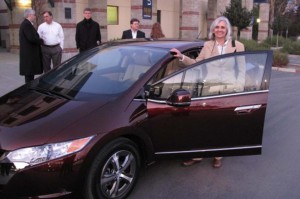“Hydrogen is the fuel of the future,” goes the adage among automotive and environmental researchers, “and it always will be.”
Back around the turn of the Millennium, its time seemed to come, only to fall out of favor once again, as battery-power gained traction – and R&D dollars. But suddenly, hydrogen is once again gaining momentum, Hyundai recently launching sales of its first fuel-cell vehicle, and with Toyota and Honda planning FCVs of their own next year.
The makers are all focusing on just the Southern California market, largely because it’s the only place where buyers currently can fill up. But a new study by the University of California, Davis says we may be approaching the tipping point where hydrogen will become the fuel of today.
“We seem to be tantalizingly close to the beginning of a hydrogen transition,” said Joan Ogden, the lead author of the study and a professor of environmental science and policy. “The next three to four years will be critical for determining whether hydrogen vehicles are just a few years behind electric vehicles, rather than decades.”
There’s a conundrum when it comes to hydrogen. The lightweight gas is the most abundant element in the universe, and the stuff that fuels the sun’s thermonuclear reaction. But here on Earth, it is available only as part of other compounds, whether water – made up of two parts hydrogen, one part oxygen – or even hydrocarbons like oil.
Creating a supply of pure hydrogen isn’t necessarily difficult. There are pipelines of the gas running not far from the Southern California coast for use in the region’s refineries and other factories. But the process has traditionally been costly and complicated.
The new U-C Davis study suggests that as a result of a “convergence of factors,” the cost of the so-called “Hydrogen Transition” could make things similar and a lot less expensive.
In fact, Ogden and her team believe that a $1 billion investment “in a series of lighthouse cities” could bring the cost of mass-producing hydrogen down to around $7.50 a kilogram within five years– a kilogram of the fuel roughly equivalent to a gallon of gasoline.
Before you write that off as still too costly, fuel-cell vehicles are significantly better at utilizing the energy content of hydrogen than even today’s best internal combustion engines are at pulling power out of gasoline. Toyota Senior Vice President Bob Carter this week told an audience at the JP Morgan Auto Conference in New York that, at that price, it would cost a motorist around $30 to drive 300 miles in the Japanese maker’s new fuel-cell vehicle.
That’s a bit more than the cost of electricity to run a battery vehicle the same distance, but would be a sizable discount compared to a compact sedan getting 30 mpg.
“Of all the advanced powertrain systems we have in our portfolio,” proclaimed Carter, “we see hydrogen fuel cells as being the no-compromise, primary-option vehicle for the next 100 years.”
(Despite skeptics, fuel-cell vehicles hit the market. For more, Click Here.)
Researchers Ogden agreed, noting that hydrogen would allow a fuel-cell vehicle to deliver similar range to a gas-powered vehicle, with a tank-up taking only three to five minutes. With rare exception, most battery-electric vehicles get a mere 100 miles per or less, with charging often taking hours.
(Click Here for details on Toyota’s FCV selling for $70,000 in Japan.)
How to get the supply of hydrogen up to mass-market levels is what the U-C Davis study focuses on. And it may not please all the environmentalists who have been pitching hydrogen as the ultimate zero-emission fuel.
“The boom in low-cost natural gas makes possible low-cost hydrogen, especially in the United States,” noted the study summary. “Methods for cost-effectively producing low-carbon hydrogen from renewable sources hold promise for greater greenhouse gas emission reductions. Hydrogen FCV emissions are already less than half that of conventional gasoline vehicles, due to the greater efficiency of the fuel cell.”
(To see how used car buyers are getting some relief as prices begin to tumble, Click Here.)
Whether using fracking will generate some opposition remains to be seen, but the overall benefits of going hydrogen could be enough to win over many proponents of fuel-cell technology.
California lawmakers recently approved funding for a network of hydrogen stations across the state, and several other states, including New York, are considering similar measures. The U-C- Davis study could add momentum to such plans. For his part, Toyota’s Carter said he expects hydrogen technology to first blossom in California, move to the East Coast and then fill in the rest of the country.

